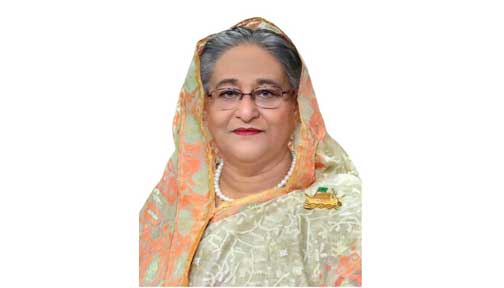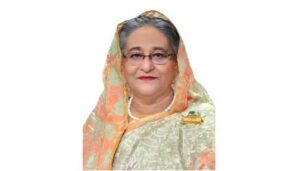

Dhaka, Broadcasting News Corporation: Prime Minister Sheikh Hasina has given the following message on the occasion of Martyrs’ Day and International Mother Language Day:
“On the occasion of the great Martyrs’ Day and International Mother Language Day, I pay my homage to the people of all languages and cultures of the world, including Bengali. UNESCO and Bangladesh have been jointly celebrating this day with due dignity since 2000. This year’s theme of the day is ‘multilingual education: a pillar of learning and intergenerational learning,’ which I think is worthy.
The importance of the language movement in the history of the Bengali liberation struggle is immense. The foundation for a non-communal, democratic, and language-based state system was laid through this movement. On this day in 1952, Abul Barkat, Abdul Jabbar, Abdus Salam, Rafiquddin Ahmad, Shafiur Rahman and many others sacrificed their lives to protect the dignity of our mother language, Bengali. I pay my profound respects to the memory of the martyrs of all languages, including Bengali; I remember with profound tribute all the language movement activists, including the Greatest Bengali of all time, the Father of the Nation Bangabandhu Sheikh Mujibur Rahman, whose supreme sacrifice and struggle elevated the esteem of our mother land, and people.
The glorious history of the language movement of Bengali from 1947 to 1952 is a source of inspiration in our national life. The Father of the Nation was repeatedly imprisoned for leading the language movement. At the Education Conference held in Karachi on 27 November 1947, it was decided that Urdu would be Pakistan’s state language. When the news reached Dhaka, the students of Dhaka University immediately protested in front of Khawaja Nazimuddin’s residence. Shortly afterward, Sheikh Mujib, a law student at Dhaka University, used his organizational experience to play a vital role in establishing the Chhatra League in Dhaka on 4 January 1948. In the first session of the Constituent Assembly on 23 February, Dhirendranath Datta of Comilla moved an amendment proposal demanding the inclusion of Bengali as the language of the Assembly. Rejecting the proposal, Khawaja Nazimuddin declared in the Legislative Assembly that the people of East Bengal would accept Urdu as the state language. But to counter the reckless decision of Nazimuddin, an all-party Chhatra Sangram Parishad was formed on 2 March at Fazlul Haque Hall of Dhaka University comprising Chhatra League, Tamaddun Majlish, and other parties. Many language movement activists, including Sheikh Mujib, were arrested in front of the Secretariat for leading the strike on 11 March and were released on 15 March. Bangabandhu Sheikh Mujibur Rahman led a rally under the historic mango tree at Dhaka University. On 21 March, Jinnah spoke out boastfully in favor of Urdu at the Dhaka Racecourse Ground. While declaring Urdu as the state language of Pakistan at the students’ convocation on 24 March at Curzon Hall, the students immediately protested.
To transform the language movement into a national campaign, Sheikh Mujib organized a nationwide tour plan, participated in an extensive campaign, and addressed rallies. He was arrested from Faridpur on 11 September 1948 and released on 21 January 1949. He was arrested again on 19 April and released in July. He was detained again on 14 October 1949 and released on 27 February 1952. Sheikh Mujib had been in touch with language movement activists and Chhatra League leaders from 1 January 1950 while in Dhaka Central Jail and had given advice and suggestions to add momentum to the movement. He sent memos to the three fellow messengers on 3 February 1952 to call for a nationwide strike on 21 February. The jail authorities shifted Sheikh Mujib from Dhaka to Faridpur Jail on 16 February while he went on a hunger strike.
The budgetary session of the East Bengal Executive Council was scheduled on 21 February 1952. Following the advice and instructions of Sheikh Mujib, a general strike was called all over the country on that day. Students violated Section-144, and the police started firing bullets indiscriminately; some lost their lives in the blink of an eye, many were injured, and many were arrested. A strike was observed on 22 February.
In 1956, the Awami League constituted the cabinet, declared Bengali the status of the state language, announced 21 February as Martyr’s Day for the first time, declared it a public holiday, and took a project to construct the Martyr’s Monument. Unfortunately, those aspirations were no longer fulfilled with the military takeover on 7 October 1958.
The Father of the Nation in independent Bangladesh directed Bengali in all official activities. He included Bengali as the state language in the constitution. He delivered a speech at the United Nation’s 29th General Assembly in Bengali and upheld the dignity of our mother language in the world assembly. During the Awami League Government’s 1996-2001 term, Rafiq and Salam, two Bangladeshi expatriates from Canada, along with some members of the international community, formed the ‘Mother Language Preservation Committee.’ They sent a proposal to the United Nations to celebrate International Mother Language Day on 21 February. UNESCO recognized 21 February as ‘International Mother Language Day’ on 17 November 1999. We have established the International Mother Language Institute. We have taken initiatives to preserve the world’s endangered languages and protect their dignity. We have ensured the use of the Bengali language in the ICT. Since 2017, we have been distributing Braille books for the visually impaired and textbooks in the mother tongues of the ethnic groups free of charge.
Bengali nationalism was established through the language movement. Following the ideals of Bengali nationalism and the Father of the Nation Bangabandhu Sheikh Mujibur Rahman, we have made Bangladesh a role model for development in the world in the last 15 years. We will transform the country into Smart Bangladesh by 2041- bringing change towards Smart Citizens, Smart Government, Smart Economy, and Smart Society. In addition, we are also implementing Bangladesh Delta Plan-2100. I firmly believe that together, we will be able to establish the developed, prosperous, and self-esteemed ‘Golden Bangladesh’ as the Father of the Nation dreamed.
Joi Bangla, Joi Bangabandhu
May Bangladesh Live Forever”
Comment Here